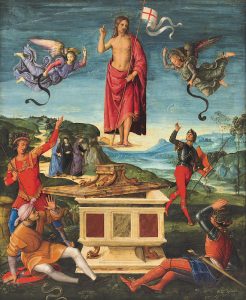Illuminations on the Lectionary readings for April 17, 2022 (Easter Sunday C – Principal Service)
First Reading or alternate Second Reading: Acts 10:34-43
Alleluia. Christ is risen! The Lord is risen indeed. Alleluia! This Sunday is Easter, the day when we remember the resurrection of Jesus Christ.

The Resurrection of Jesus Christ (c.1499[1502), Raphael oil painting on wood by Raffaello Sanzio da Urbino (Rafael, 1483-1520). São Paulo Museum of Art, Brazil. (Click image to enlarge.)
Alternate First Reading: Isaiah 65:17-25
In the closing pages of Isaiah’s great book of prophecy, the people have returned home to Jerusalem from their long exile in Babylon. Much work remains to be done to restore the demolished city and its temple, but this is a time for celebration. God promises through the prophet to make Jerusalem a virtual heaven on earth, where everyone will enjoy abundance and happiness, peace and joy; even the wolf and the lamb shall feed peacefully together! As Christians celebrate the resurrection of Jesus on Easter Sunday, we too imagine a new kingdom where all will be physically and spiritually fed.
Psalm: Psalm 118:1-2, 14-24
In this ancient hymn we remember Israel’s joyful thanks to God for its return from exile. While the prophetic words, “The stone that the builders rejected has become the chief cornerstone,” spoke of the temple in Jerusalem, Christians have long borrowed this verse of Psalm 118 as a metaphor for Jesus. The words shout out the hope of an Easter people: “I shall not die, but I shall live … The Lord … did not give me over to death. … you have answered me and have become my salvation.”
Second Reading: I Corinthians 15:19-26
In his pastoral words to the early Christians of Corinth – who were puzzled by the theology of resurrection and probably arguing about it – Paul tries to express the resurrection and its significance in simple terms: Reminding the Corinthians of Adam’s fall and the ancient tradition of offering the first fruits of the harvest to God, Paul tells them that Christ’s resurrection makes him the first fruit of everlasting life, and this changes everything. The resurrection promises the arrival of God’s kingdom on earth and of eternal life. If Christ has risen, Paul says, then all who believe in him will also rise again.
Gospel: John 20:1-18
Each of the four Gospel accounts of the resurrection is slightly different, reflecting the traditions of its community of origin. In John’s Passion we walk this road with Mary Magdalene, seeing her in tender verses as the only one who stayed behind at the empty tomb after the others had left. John portrays her as the first person to meet and speak with the risen Christ, and the one sent to proclaim the good news of his resurrection to the others. As in many other Gospel accounts of the risen Christ encountering his friends in unexpected ways, Mary did not recognize Jesus at first. But when he calls her name, we can feel the joy in her delighted response, “Rabbouni!”
Alternate Gospel: Luke 24:1-12
Eyewitness accounts of any great account often differ on the details, and the Gospels’ resurrection narratives are certainly no exception. Only Luke, for example, tells us that the women who had come with Jesus from Galilee were the first to learn that Jesus was risen; and he even tells us the names of three of them: Mary Magdalene, Joanna, and Mary the mother of James. When they ran back to tell the men this wonderful news, though, the men thought they were only telling “an idle tale,” until Peter ran to the empty tomb to see for himself.
